The China Factor in 2020 Taiwan Elections
Prepared for the Greater Dallas Taiwan Chamber of Commerce Director Board Meeting, May 16th, 2019
Karl Ho
University of Texas at Dallas
Background
In 2018, the ruling party Democratic Progressive Party (DPP) suffered major defeats in local and mayoral elections. The loss in the south including Kaohsiung was unprecedented.
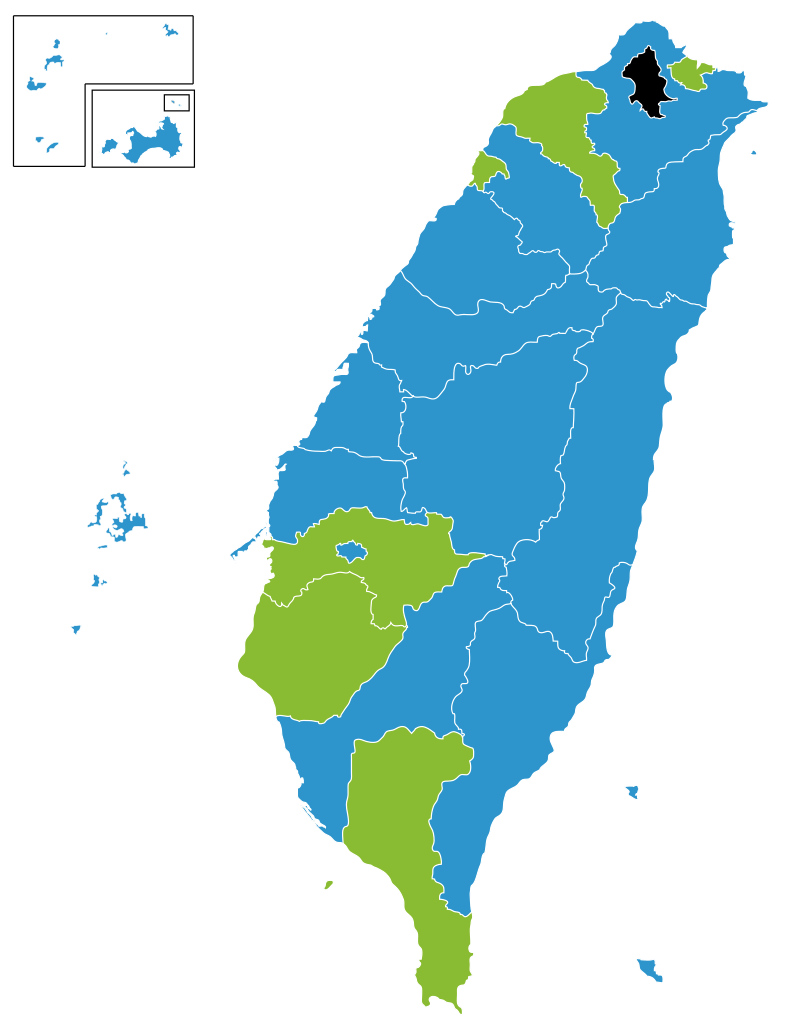
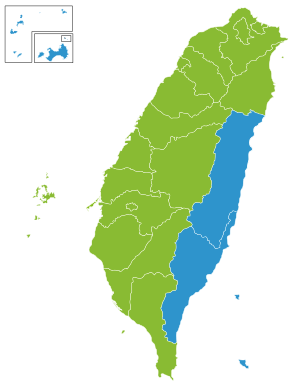
2016
2018
Background
-
Is Taiwan politics becoming more volatile?
-
How much do the issue impacts change from elections to elections?
-
What is the outlook of the 2020 elections?
In 2018, the ruling party Democratic Progressive Party (DPP) suffered major defeats in local and mayoral elections. The loss in the south including Kaohsiung was unprecedented.

Logistic Regression: Issue Impacts on Tsai Vote (2016)
Clark, Ho and Tan (2016)

Findings: 2004-2016 Surveys
-
Party identification variables have strong effects guiding the issue variables.
-
Three important variables stand out:
-
National identity issue (Independence vs. unification)
-
Economic evaluations
-
Taiwanese identity (Taiwanese vs. Chinese)
-
-
Demographic variables are weak (age, income.
-
Effect sizes vary, even though the same metrics are used (1,0)
New methods
-
We run regression models using resampled data with all combinations of relevant variables.
-
Each year, we estimated over 16,000 models to test the stability of the effects.
Figure 2. Issue effects in Taiwan elections:
Support Independence
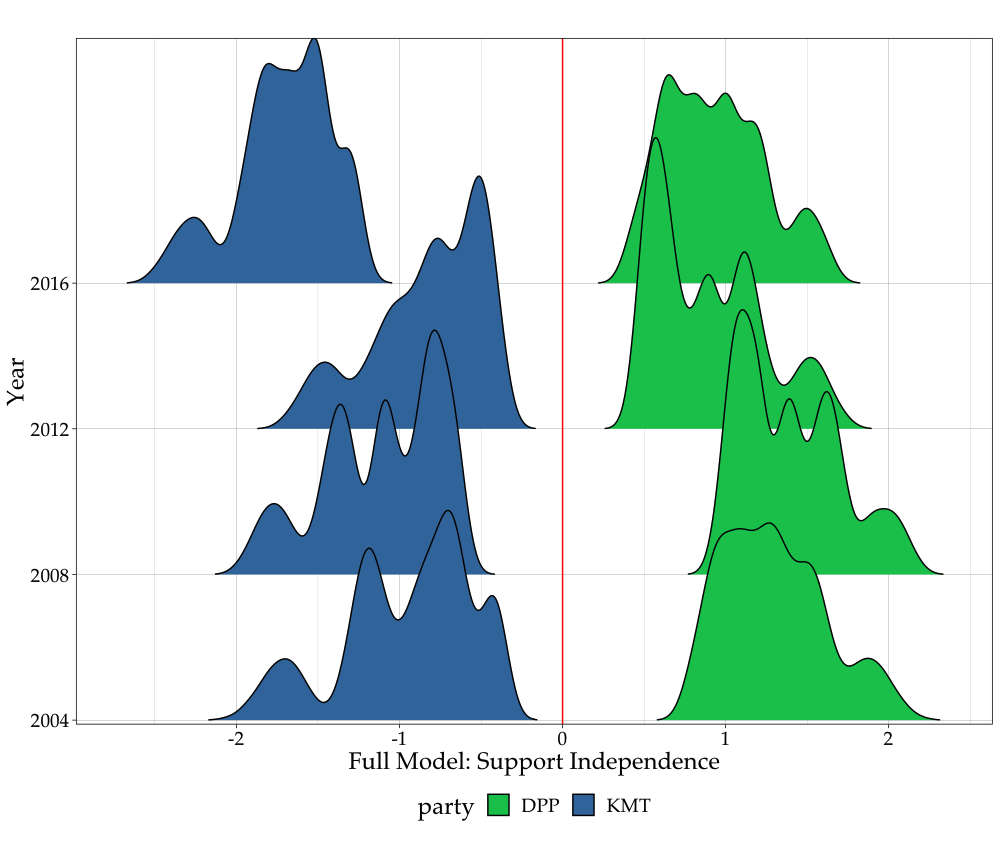
Closer to middle red line means the weakening of effects
Note the stronger negative impact on KMT in 2016
Figure 3. Issue effects in Taiwan elections:
Economic evaluations
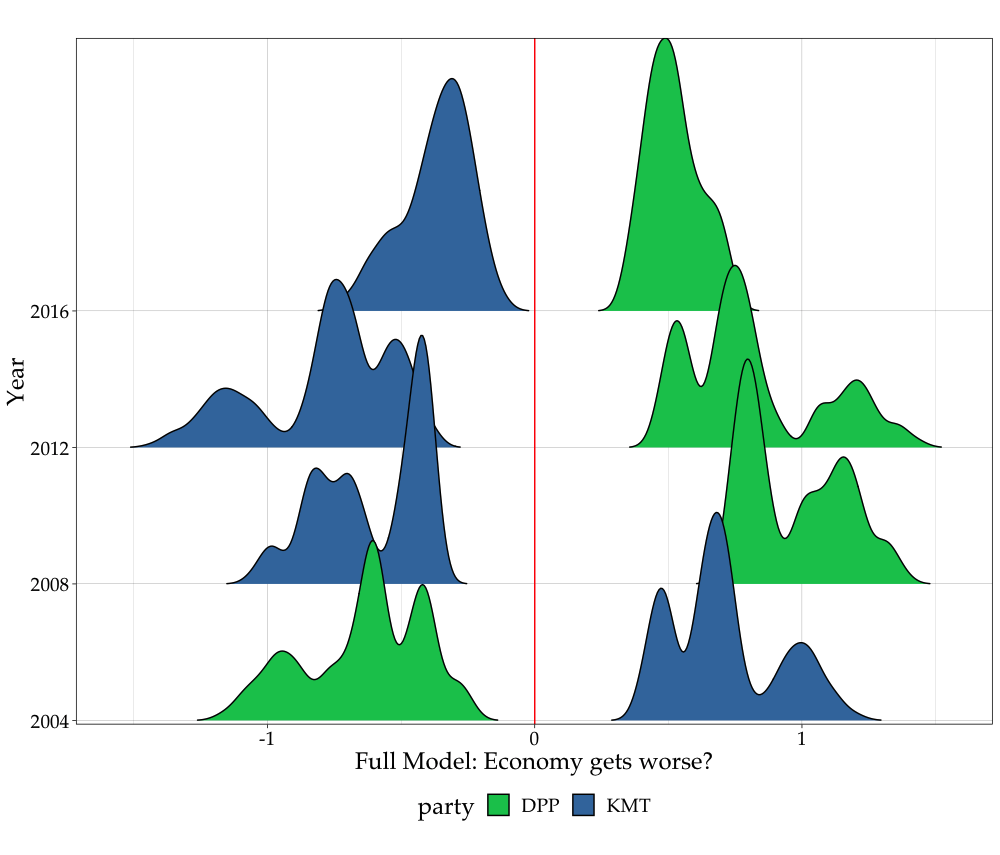
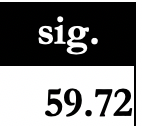
Figure 4. Issue effects in Taiwan elections:
Taiwanese
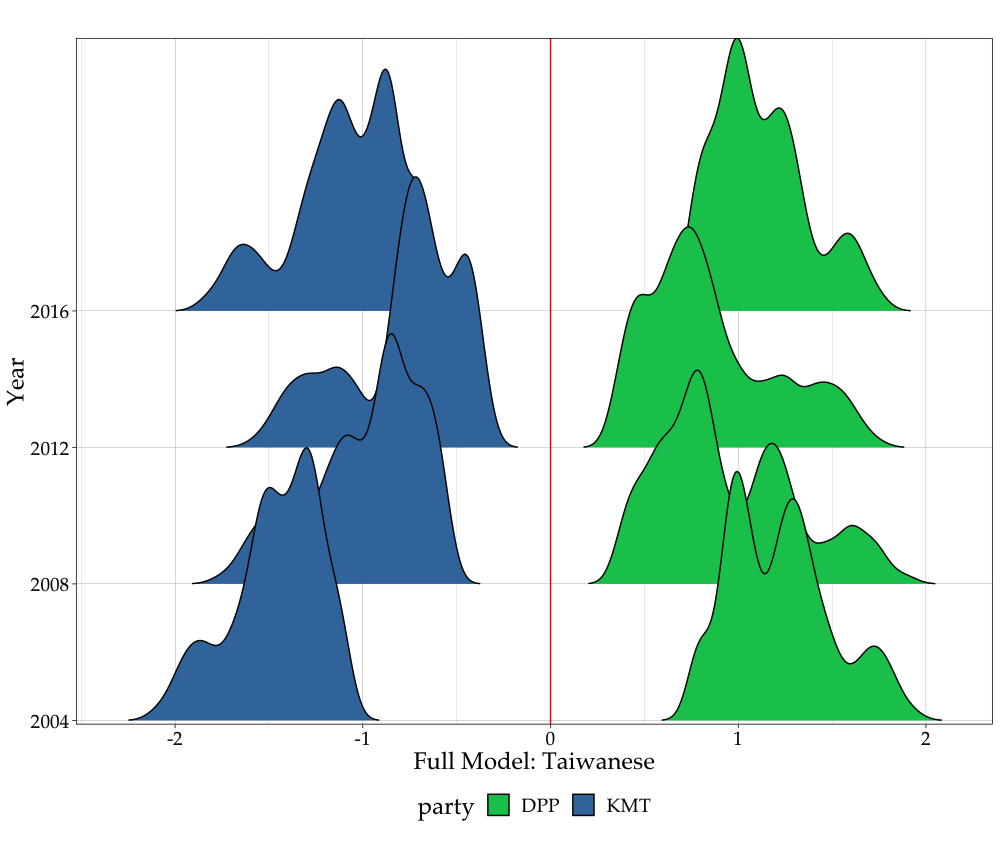
Summary
-
Asymmetry of impacts in the national identity continuum prevails. Independence proponents have been showing stronger support for DPP than unification proponents to KMT.
-
Taiwanese identity polarizes further the blue and green in 2016.
-
Economic factors may not be the predominant driving forces of future elections, in competition with other identity factors and party effects.
Trends of public opinion data
-
Multiple candidates from more than blue and green camps comparing to Blue vs. Green in the past
-
Many many more surveys of different modes:
-
Telephone
-
Landline
-
Mobile
-
-
Internet
-
Face-to-face
-
-
Social media, internet data: Big data methods
DPP competitions
Source: ETtoday (https://www.ettoday.net/news/20190515/1444988.htm)
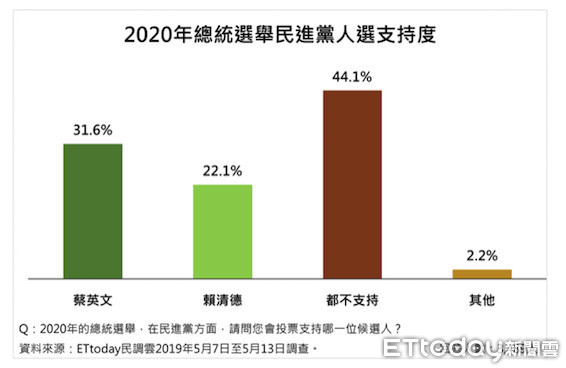
KMT competitions
Viable candidates: Terry Guo vs. Han Kuo-yu
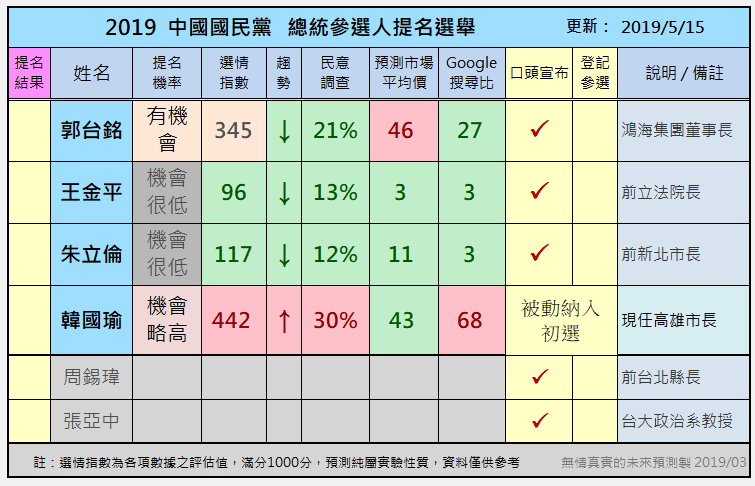
Source: 無情真實的未來預測 (https://tsjh301.blogspot.com)
KMT competitions
Viable candidates: Terry Guo vs. Han Kuo-yu
- Determining factors
- Polls
- Internet data
- volume, name recognition, discussion
- supporting networks
- Events leading to January, 2019
Survey Data: Han-Ko-Tsai



| Date | Han Kuo-yu | Ko Wen-je | Tsai Ing-wen | Lead |
|---|---|---|---|---|
| March, 2019 | 36.7% | 27.9% | 20.3% | 9.0% |
| April, 2019 | 38.6% | 25.3% | 23.5% | 13.7% |
| May, 2019 | 35.3% | 24.6% | 25.7% | 10.0% |
Note: Averages from 18 surveys by multiple pollsters
Source: 無情真實的未來預測 (https://tsjh301.blogspot.com)
Survey Data: Han-Ko-Tsai



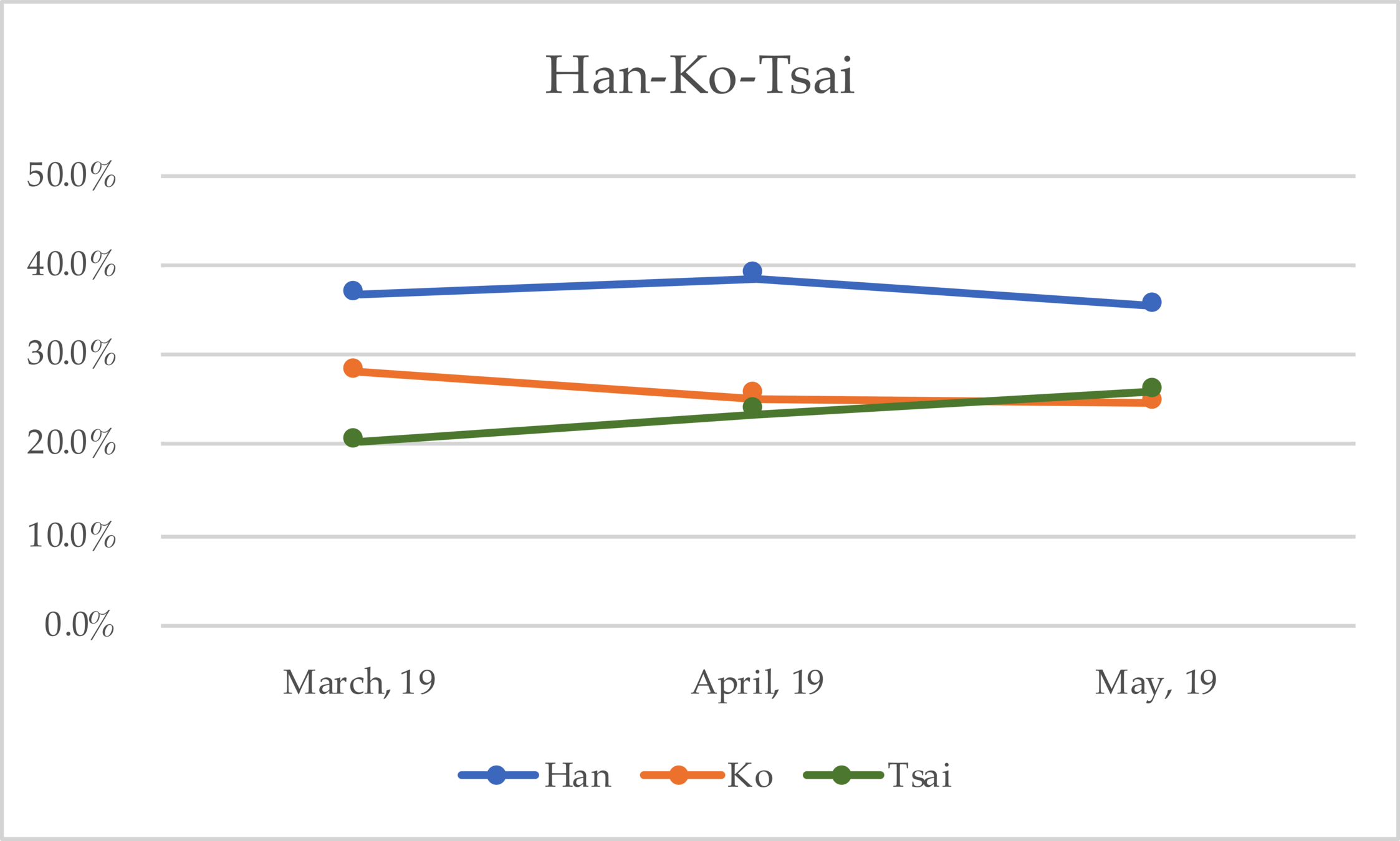
Note: Averages from 18 surveys by multiple pollsters
Source: 無情真實的未來預測 (https://tsjh301.blogspot.com)
Survey data
| 調查單位 | 「樣本」 | 發布日期 | 韓國瑜 | 柯文哲 | 蔡英文 | 領先 | 中立/未表 |
|---|---|---|---|---|---|---|---|
| TVBS民調 | 1,015 | 3/20/19 | 38.0% | 28.0% | 18.0% | 10.0% | 16.0% |
| 美麗島民調 | 1,072 | 3/26/19 | 35.4% | 27.8% | 22.6% | 8.0% | 14.2% |
| 山水民調 | 1,087 | 4/2/19 | 37.4% | 30.1% | 22.3% | 7.0% | 10.2% |
| 世新大學 | 1,068 | 4/18/19 | 40.1% | 26.5% | 26.2% | 14.0% | 7.2% |
| 美麗島民調 | 1,087 | 4/20/19 | 37.8% | 22.9% | 24.8% | 13.0% | 14.5% |
| 聯合報 | 1,178 | 4/22/19 | 36.0% | 26.0% | 20.0% | 10.0% | 18.0% |
| ET民調(含網路) | 7,868 | 4/23/19 | 38.9% | 23.0% | 27.8% | 11.0% | 10.3% |
| TVBS民調 | 1,222 | 4/26/19 | 42.0% | 25.0% | 22.0% | 17.0% | 11.0% |
| 美麗島民調 | 1,068 | 4/29/19 | 32.3% | 24.1% | 24.3% | 18.0% | 19.3% |
| 旺旺中時 | 1,004 | 5/1/19 | 41.1% | 25.0% | 20.9% | 16.0% | 13.0% |
| TVBS民調 | 1,222 | 4/26/19 | 42.0% | 25.0% | 23.0% | 17.0% | 10.0% |
| 趨勢民調 | 1,069 | 5/3/19 | 35.4% | 23.4% | 28.0% | 7.0% | 13.2% |
| 循證民調 | 1,101 | 5/3/19 | 32.6% | 26.0% | 27.9% | 5.0% | 13.5% |
| 遠見調查 | 1,166 | 5/8/19 | 36.3% | 27.1% | 20.6% | 19.0% | 16.0% |
| TVBS民調 | 951 | 5/10/19 | 39.0% | 26.0% | 25.0% | 13.0% | 10.0% |
| 典通民調 | 1,077 | 5/14/19 | 34.3% | 22.7% | 28.3% | 6.0% | 14.7% |
| 台灣指標 | 1,188 | 5/15/19 | 31.5% | 24.1% | 25.0% | 7.0% | 19.4% |
| ET民調(含網路) | 3,489 | 5/15/19 | 38.2% | 22.7% | 25.4% | 13.0% | 13.7% |
Survey Data: Gou-Ko-Tsai
Note: Averages from 14 surveys by multiple pollsters
Source: 無情真實的未來預測 (https://tsjh301.blogspot.com)


| Date | Terry Guo | Ko Wen-je | Tsai Ing-wen | Lead |
|---|---|---|---|---|
| April, 2019 | 32.1% | 26.7% | 24.1% | 5.9% |
| May, 2019 | 29.5% | 26.8% | 26.4% | 3.2% |

Survey Data: Gou-Ko-Tsai



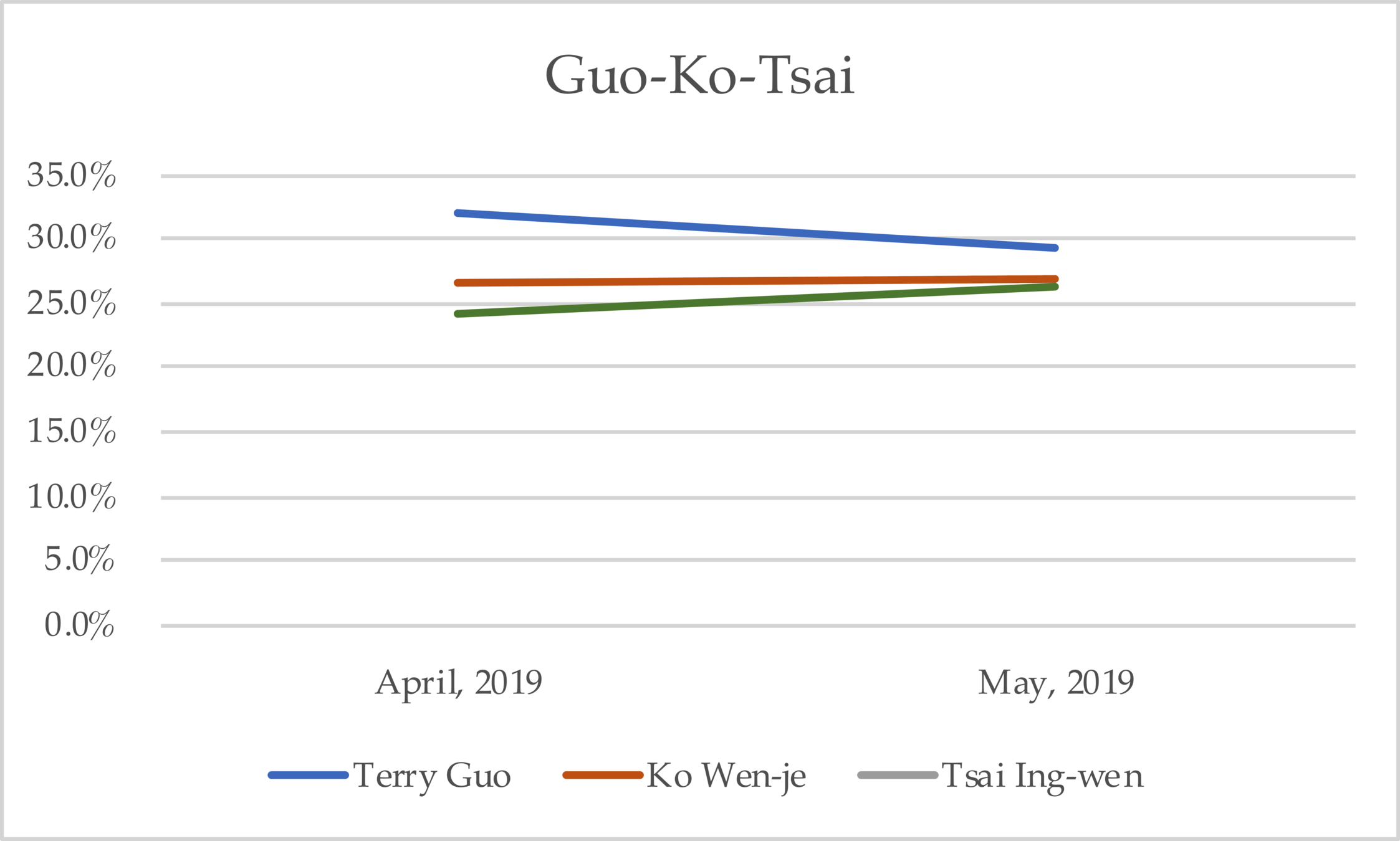
Note: Averages from 14 surveys by multiple pollsters
Source: 無情真實的未來預測 (https://tsjh301.blogspot.com)
Survey data
| 調查單位 | 「樣本」 | 發布日期 | 郭台銘 | 柯文哲 | 蔡英文 | 領先 | 中立/未表 |
|---|---|---|---|---|---|---|---|
| 山水民調 | 1,087 | 4/2/19 | 33.1% | 33.1% | 24.1% | 0.0% | 9.7% |
| 世新大學 | 1,068 | 4/18/19 | 35.6% | 25.2% | 20.2% | 10.0% | 19.0% |
| 美麗島民調 | 1,087 | 4/20/19 | 34.1% | 24.3% | 24.7% | 9.0% | 16.9% |
| 聯合報 | 1,178 | 4/22/19 | 31.0% | 27.0% | 20.0% | 4.0% | 22.0% |
| 展欣手機民調 | 1,011 | 4/22/19 | 32.1% | 26.0% | 31.3% | 6.0% | 10.6% |
| ET民調(含網路) | 7,868 | 4/23/19 | 35.8% | 22.7% | 27.1% | 13.0% | 14.4% |
| TVBS民調 | 1,222 | 4/26/19 | 31.0% | 28.0% | 22.0% | 3.0% | 19.0% |
| 美麗島民調 | 1,068 | 4/29/19 | 23.1% | 26.4% | 25.5% | 3.0% | 25.0% |
| TVBS民調 | 1,222 | 4/26/19 | 33.0% | 28.0% | 22.0% | 5.0% | 17.0% |
| 趨勢民調 | 1,069 | 5/3/19 | 25.7% | 28.5% | 27.6% | 3.0% | 18.2% |
| 循證民調 | 1,101 | 5/3/19 | 27.9% | 29.1% | 27.3% | 1.0% | 15.7% |
| TVBS民調 | 951 | 5/10/19 | 31.0% | 30.0% | 24.0% | 1.0% | 15.0% |
| 典通民調 | 1,077 | 5/14/19 | 27.6% | 23.6% | 28.4% | 1.0% | 20.4% |
| ET民調(含網路) | 3,489 | 5/15/19 | 35.1% | 22.7% | 24.8% | 10.0% | 17.4% |
Internet Data
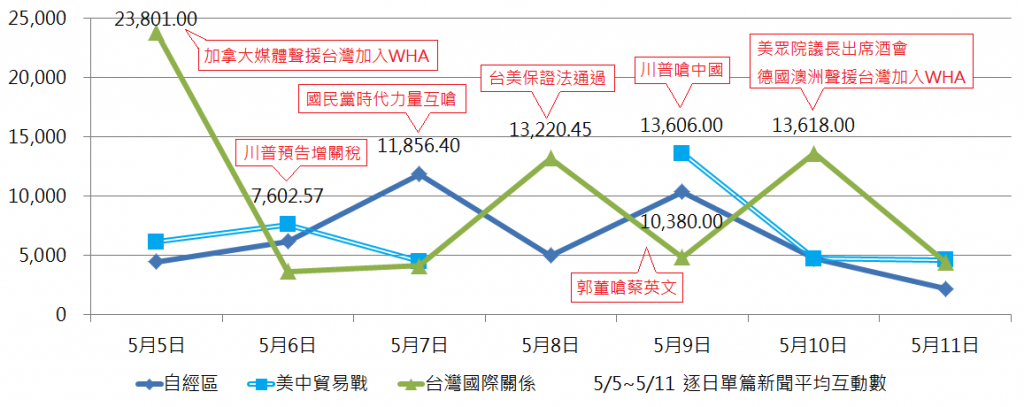
Source: SwayStrategy
US influence
US influence
US influence
US influence
US Influence
-
Presidential Phone call: Trump and Tsai
-
Armament sales
-
Congressional bills/laws on Taiwan:
-
Taiwan Relations Act
-
Taiwan Travel Act
-
Taiwan Assurance Act
-
China factors
-
1996: Missile crisis
-
2000's: ECFA, CSSTA
-
Since 2016:
-
Row over "92 Consensus"
-
Ban Taiwan from WHA, ICAO
-
De-recognitions (by five countries)
-
Xi's address to Taiwan "Compatriots"
-
"Turning point" factors
-
Trade war
-
Triangular equilibrium challenged
- Rising China vs. US withdrawal
- Relative vulnarability of Taiwan
-
Asymmetry in Taiwan elections
- Other External factors
- Support network structures
- Generational divide
Discussions
-
Long cycle observations
-
Electoral cycle
-
Comparative developments
-
Party system in tact?
-
-
Short term forces
-
It is a democracy!